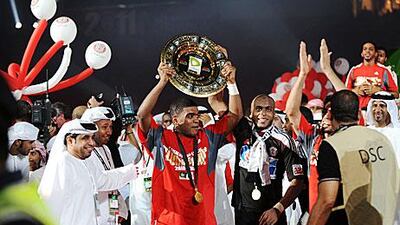When assessing The Year of Al Jazira, perhaps the most telling statistic is this one: Emiratis scored 36 goals for the champions.
As good as the South American attacking trio of Ricardo Oliveira, Matias Delgado and Bare were, and they were very good indeed, scoring 28 goals among them, the runaway champions clearly owed their dominant performance to the play of the UAE nationals in their side.
Ibrahim Diaky, Ali Kasheif, Abdullah Mousa, Khalid Sabeel, Juma Abdullah, Subait Khater and Yasir Matar represented an Emirati talent base that no other side in the league could match.
If Jazira are now the template for success in domestic football - and they should be after winning 48 games and losing only four from 66 in the past three seasons - the takeaway clearly is that expatriates can take a team to the top, but only when an Emirati core provides the base.
Also: The players who shone this season
Al Shabab fielded four foreigners in the now-complete season who among them scored 26 goals, or only two fewer than did Jazira's expatriates. But Shabab's Emiratis scored only 16 goals, which is why the Dubai side finished fourth, with 34 points to Jazira's 53.
With their 36 goals, Jazira's nationals outscored half the teams in the league. They were particularly prominent in the first half of the season, when Jazira took control of the championship chase while Bare was struggling, Delgado was rounding into form and Oliveira was still in Brazil.
Jazira were one of only four Pro League sides who got more goals from nationals than expatriates. And unlike the other three (Al Wahda, Dubai, Al Ahli), Jazira's Emiratis outscored their foreign teammates from start to finish.
Abel Braga, Jazira's swashbuckling coach who now goes home to Brazil, always emphasised attack, almost to the point of recklessness.
He was able to make it work, at least domestically, because he had Diaky directing the attack (and scoring 12 goals), Mousa and Sabeel charging up the flanks, Khater and Matar holding in midfield, Abdullah coming forward on set pieces and Kasheif in goal making acrobatic saves.
As the league's 12 sides begin to regroup for 2011/12, the focus, as always, will be on the recruitment of foreigners with impressive CVs.
However, Jazira have shown that it is the less-dramatic moves to acquire and retain the best Emiratis that make for a superior side.
To wit: early in the season Jazira bought Sami Rabea from Al Wasl to plug a hole in central defence. It was the sort of move that gains little attention, even among Emirati analysts. But Rabea, a solid veteran presence, became a key figure for the Jazira side that did not suffer a defeat until their 21st game.
A quick look around the league shows several clubs who seem to have a promising Emirati core. Baniyas, Wahda and Al Ain seem prominent.
Baniyas, the fast-rising club who finished second in only their second season since promotion from the First Division, have a dynamic playmaker in Amer Abdulrahman, a dangerous winger in Theyab Awana, a fine central defender in Yousef Jaber and a quietly efficient goalkeeper in Mohammed Ghuloom, who conceded only 14 goals in 17 games, the best ratio in the league.
Wahda boast the premier Emirati goalscorer in Ismail Mater and a solid back four led by Hamdan al Kamali.
Al Ain, the nine-time champions, were at risk of relegation until the second-to-last match, in part because their foreign contingent scored so few goals, a league-low 14. But their Emirati core picked up valuable experience, including the 19-year-old playmaker Omar Abdulrahman, arguably the breakthrough player of the season; his goal-scoring brother Mohammed and the defenders Fares Juma and Ismail Ahmed.
The 2010/11 season also would seem to have reinforced the notion that clubs are ill-advised to recruit foreigners who play in non-attacking positions.
As important as it clearly is to have Emiratis who can contribute to scoring, it seems unwise to spend a precious expatriate slot on a defender or holding midfielder. Ahli famously acquired the former Fifa World Player of the Year Fabio Cannavaro, 37, and midway through the season added the Moroccan holding midfielder Karim el Ahmadi.
Cannavaro did not score a goal, and el Ahmadi contributed one, a factor in Ahli's season total of 32 goals, fourth-bottom in the league. Not surprisingly, Ahli finished eighth.
The team in the best position to replicate the Jazira experience of the past three seasons are … Jazira, suggesting that the Abu Dhabi side's wait for a second championship may be far shorter than the 37 years they needed for their first.

